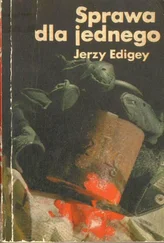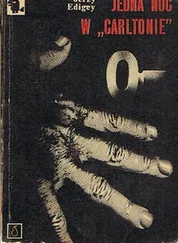“The Apostle Paul writes about authority that comes from God. If Gomułka’s authority comes from God, I fear I’ll lose my faith,” said Sexton Messerschmidt acidly.
“In the first place, the apostle says that every authority comes from God,” Father Pastor Potraffke interrupted him, and with a gesture of his hand he quieted the polemicists who were ready with immediate ripostes. “I agree. I agree, that it is doubtless a matter here of true authority, and that the false, usurpatory authority of the brother Communists does not come from God. But the Fifth Commandment, brothers and sisters, does come from God, and there are no exceptions to it.”
“Maybe you don’t make any exceptions, but we do. This is the basis of our superiority over you. The Catholic Church is the Church of elastic intellectuals, and your Lutheran Church is the Church of dogmatic doctrinalists,” Station Master Ujejski smiled venomously.
“People, hold me back, or I’ll have to remind him of the Second Schmalkaldic War,” cried out Sexton Messerschmidt.
“He who lacks arguments resorts to fisticuffs,” said Station Master Ujejski in a voice that vibrated with rage, though it was still rather calm. After a moment, however, fury took possession of him entirely. He leaned out in the direction of the Sexton and began to hiss hatefully: “The Battle of White Mountain didn’t teach you a thing, it didn’t teach you a thing! St. Bartholomew’s Night didn’t teach you a thing. .”
“Brothers, calm yourselves!” cried out Father Pastor Potraffke. “Let the spirit of peace reign between you!”
And after a moment, as if wishing to reinforce the spirit of peace with the sprit of sobriety, he turned to Station Master Ujejski:
“What sorts of exceptions do you have in mind? What exceptions can there be to the Fifth Commandment?”
“Thomas Aquinas answers the question whether it is possible to grant dispensation from the Ten Commandments in the affirmative: it is possible to grant dispensation,” replied Station Master Ujejski, now with a calmer tone, “because the Commandments belong to natural law, and natural law is sometimes fallible, and thus it is possible to grant dispensation.”
“The Commandments are established by God, thus I think only God could grant dispensation from them,” said the Pastor’s Wife, shrugging her shoulders.
“God works with the hands of men.” The Station Master was quite clearly passing from arousal to apathy.
“Does Thomas Aquinas speak in so many words about granting dispensation from the prohibition against killing?” Grand Master Swaczyna asked.
“Yes, in so many words,” Station Master Ujejski barely moved his lips. “He says that people are given dispensation from the prohibition against killing since, according to human law, it is permitted to kill people — for instance criminals or enemies.”
“Absolutely right, as far as I’m concerned,” threw in Commandant Jeremiah. “As far as I’m concerned, I’m for the death penalty. It will be better for more than one scoundrel if he is buried before it is too late.”
“I could say,” Mr. Trąba said with a somewhat forced smile, “I could say that all the arguments mentioned suit my dying intentions well. Dispensation from the Fifth Commandment suits me. Permission to kill an enemy and a criminal suits me. The existence of capital punishment suits me. Incidentally, as far as the medieval opinion on the licitness of tyrannicide is concerned — I’m speaking to you, Mr. Station Master, but you’re sleeping,” and indeed the Station Master’s eyes were closed, and his head had fallen onto his chest, “—as far as the medieval opinion on tyrannicide is concerned, this was partially revoked by the Council of Constance. But of course we Lutherans — maybe it is better that you’re sleeping, Mr. Station Master — we Lutherans don’t care about either Thomas Aquinas or some council from the mists of history. We Lutherans care about Luther. And Luther — although he does not allow tyrannicide — allows punishment. ‘Be ye therefore merciful, as your Father is also merciful,’ he cites Scripture, but it does not follow from this, he adds, that there shouldn’t be punishment at all. There must be punishment, and it is the superior authorities who are to punish. If injustices should not cease, make report about this, says Luther, to your superior authority, your father or whomever is placed over you to exercise office: it is their task to punish according to righteousness. Yes,” Mr. Trąba sighed deeply, “I think it is clear to all that in the current situation, here and now, the Reformer’s recommended legalism is a troublesome utopia, and it is necessary to take matters into our own hands. Gomułka’s superior authority is Khrushchev, and if I wanted to abide strictly by the counsel of Doctor Martin Luther, I would have to direct my complaint against Gomułka to Khrushchev. Which is absurd.”
“It’s only slightly less absurd than killing Gomułka.” Commandant Jeremiah persisted in his increasingly peculiar commonsense argumentation.
“No, a hundred times no,” Mr. Trąba raised his voice. “I’ve worked the problem out theoretically without a hitch, just as I hope to hit him in the heart without a hitch. I name myself, in the name of historical righteousness, the superior authority of First Secretary Władysław Gomułka, and as the superior power I will mete out the death penalty to him.”
“And thereby you ennoble him, Mr. Trąba. You will join the ranks of the great assassins of mankind, but you also add Gomułka to the ranks of the great tyrants of mankind. Doesn’t that bother you?” asked Grand Master Swaczyna.
“This pains me, but unfortunately there are no ideal solutions,” Mr. Trąba replied, and he turned to Father Pastor Potraffke:
“I’m terribly sorry, but whom did you have in mind? What Protestants took part in assassination attempts upon the highest power?”
“Not searching too far afield, a certain Lutheran, Bogumił Frankemberg, a locksmith from Cybulice, took part in the famous, although fortunately failed, attempt on the life of the last king of the Commonwealth.”
“You are thinking of the disgraceful abduction of Stanisław August Poniatowski that ended with the retreat of the conspirators, with the exception of one who, seeing what was happening, went over to the side of the king? Do you have in mind the famous coup that ended with the rescue of our last crowned head by an accidental miller in Marymont?” Mr. Trąba was making certain he’d understood correctly.
“Your coup will end up just the same, a fiasco, everything will come to nothing, you’ll wander around, you’ll get lost, you’ll end up, if not in a mill in Marymont, then in the police station on Marszałkowska Street, you’ll get drunk as swine.” Commandant Jeremiah had clearly lost what was left of his patience. “By the way, why aren’t you drinking, Mr. Trąba? After all, you were supposed to be dying of drink, and for that reason you intend to commit a crime. And what do I see here? You’re not drinking?”
“You go too far, Commandant.” Mr. Trąba grew pale, and his hands began to shake. “Those arguments are below the belt. Moreover, in a plan of elementary logic you confuse causes with effects.”
“Brothers, calm yourselves,” Pastor Potraffke once again appealed for peace. “And what if,” he continued in a tone of somewhat too studied conciliation, “what if you were to tie this not to the idea of real regicide, since it is indeed difficult to find an example of that in our history, but to the idea of symbolic regicide?”
“Just what do you have in mind?” Father asked.
“There are known cases of attempts not upon the person of the ruler but upon his image. For example, Prince Józef Jabłonowski, enraged at that same unfortunate Stanisław August Poniatowski, ordered a portrait of the king hung in his private dungeon, and he placed guards by that imprisoned image. Likewise the portrait of King Jan III Sobieski fell victim to an assassin’s attempt. A certain nobleman, whose name I don’t remember, simply hacked the likeness of the king to pieces with his saber, for which, moreover, he paid with his neck.”
Читать дальше












